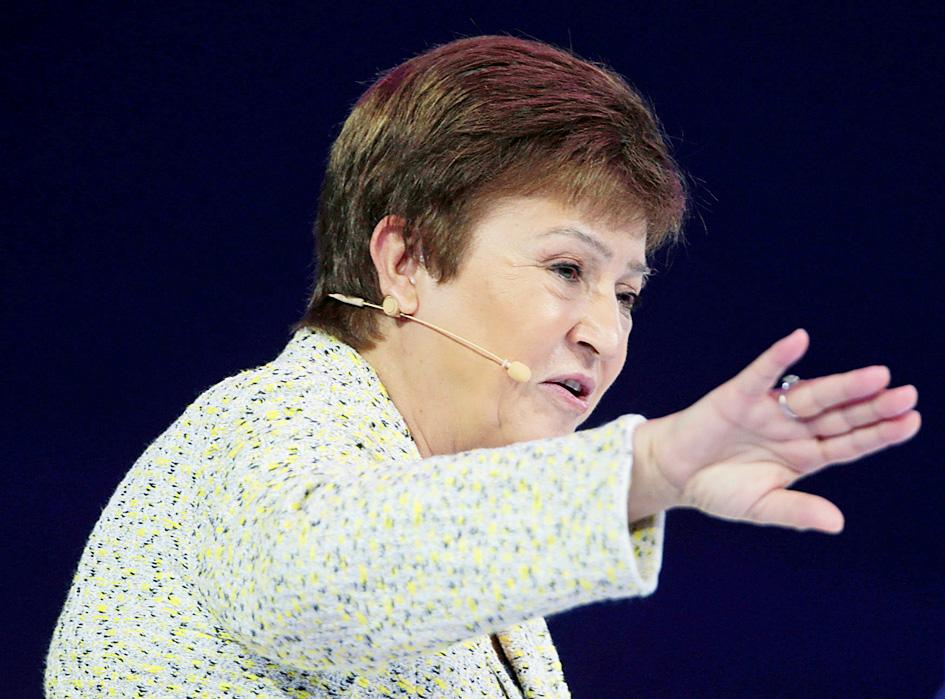Global finance leaders on Tuesday said the world economy had so far escaped a collapse triggered by the COVID-19 pandemic, but warned that failure to conquer the outbreak, maintain stimulus and tackle mounting debt among poor nations could crush a fragile recovery.
At the start of the annual meetings of the IMF and World Bank, the fund issued slightly improved growth forecasts spurred by unexpectedly stronger rebounds from COVID-19 lockdowns in the wealthiest countries and China.
The IMF now forecasts world GDP would shrink 4.4 percent this year, compared with the 5.2 percent drop seen in June, according to the World Economic Outlook released on Tuesday.

Photo: EPA-EFE
For next year, the IMF sees growth of 5.2 percent, down from 5.4 percent.
The report includes revisions to June’s forecasts and other historical data to reflect updated country weightings.
“The story is less dire than we thought three months ago, but dire nonetheless,” IMF managing director Kristalina Georgieva said during a panel discussion that was held virtually.

Photo: Reuters
Georgieva said governments needed to stay focused on their healthcare responses to COVID-19 and must not withdraw stimulus prematurely.
“If we cut these lifelines that have been extended to families and businesses before we are out of the health crisis, this could be catastrophic in terms of bankruptcies, unemployment and undoing all that has been done so far,” she said.
The upward revision in the IMF’s growth forecast for this year reflects in particular better-than-projected second-quarter growth in the US and the eurozone, a stronger-than-expected return to growth in China and signs of a more rapid recovery in the third quarter.
The US economy is projected to contract 4.3 percent this year, compared with a previous 8 percent estimate, the most-improved forecast among major economies.
However, that does not factor in potential additional fiscal stimulus, as US President Donald Trump and Democrats continue to wrangle over measures.
Growth is pegged at 3.1 percent next year, down from a prior forecast of 4.5 percent.
The eurozone is estimated to shrink 8.3 percent this year, compared with the previous 10.2 percent projection, before expanding 5.2 percent next year, down from 6 percent.
Advanced economies overall are seen declining 5.8 percent this year, compared with 8.1 percent previously.
By contrast, the outlook for emerging markets, some with rising infections, has worsened slightly, with a 3.3 percent contraction anticipated for this year, compared with 3.1 percent previously.
China remains the lone major economy estimated to expand, by 1.9 percent this year and 8.2 percent next year.
India saw the steepest forecast reduction, with a 10.3 percent contraction seen for this year, compared with just 4.5 percent previously, after a larger-than-expected second-quarter contraction.
The G20 major economies, in a draft communique seen by Reuters, said the outlook was “less negative” due to the positive impacts from actions already taken, but the recovery would be “uneven, highly uncertain and subject to elevated downside risk.”
“We will sustain and strengthen as necessary our policy response, considering the different stages of the crisis, to secure a stable and sustainable recovery,” G20 finance ministers and central bank governors said in the draft ahead of a meeting yesterday.
The draft also said the G20 would agree to extend a freeze on the servicing of official bilateral debt for poor countries for another six months beyond the end of this year.
That is well short of the year-long extension sought by the IMF, the World Bank and many emerging market nations, but the G20 agreed to review the debt situation in April next year to determine whether another six-month extension would be warranted.
The freeze aims to free up billions of dollars that poor countries can divert to their pandemic health and economic responses.
Additional reporting by Bloomberg

Intel Corp chief executive officer Lip-Bu Tan (陳立武) is expected to meet with Taiwanese suppliers next month in conjunction with the opening of the Computex Taipei trade show, supply chain sources said on Monday. The visit, the first for Tan to Taiwan since assuming his new post last month, would be aimed at enhancing Intel’s ties with suppliers in Taiwan as he attempts to help turn around the struggling US chipmaker, the sources said. Tan is to hold a banquet to celebrate Intel’s 40-year presence in Taiwan before Computex opens on May 20 and invite dozens of Taiwanese suppliers to exchange views

Application-specific integrated circuit designer Faraday Technology Corp (智原) yesterday said that although revenue this quarter would decline 30 percent from last quarter, it retained its full-year forecast of revenue growth of 100 percent. The company attributed the quarterly drop to a slowdown in customers’ production of chips using Faraday’s advanced packaging technology. The company is still confident about its revenue growth this year, given its strong “design-win” — or the projects it won to help customers design their chips, Faraday president Steve Wang (王國雍) told an online earnings conference. “The design-win this year is better than we expected. We believe we will win

Chizuko Kimura has become the first female sushi chef in the world to win a Michelin star, fulfilling a promise she made to her dying husband to continue his legacy. The 54-year-old Japanese chef regained the Michelin star her late husband, Shunei Kimura, won three years ago for their Sushi Shunei restaurant in Paris. For Shunei Kimura, the star was a dream come true. However, the joy was short-lived. He died from cancer just three months later in June 2022. He was 65. The following year, the restaurant in the heart of Montmartre lost its star rating. Chizuko Kimura insisted that the new star is still down

While China’s leaders use their economic and political might to fight US President Donald Trump’s trade war “to the end,” its army of social media soldiers are embarking on a more humorous campaign online. Trump’s tariff blitz has seen Washington and Beijing impose eye-watering duties on imports from the other, fanning a standoff between the economic superpowers that has sparked global recession fears and sent markets into a tailspin. Trump says his policy is a response to years of being “ripped off” by other countries and aims to bring manufacturing to the US, forcing companies to employ US workers. However, China’s online warriors